Taxation Law: Advice on Residency and Tax Liability for Mr. Nguyen
VerifiedAdded on 2022/09/14
|11
|2554
|10
Report
AI Summary
This report is a comprehensive letter of advice addressing Mr. Nguyen's residency status and tax liability concerning income earned in Saudi Arabia, as questioned by the ATO. It analyzes the case facts, applying the resides test, domicile test, and 183-day test to determine Nguyen's residency status for the 2017 and 2018 tax years. The report concludes that Nguyen qualifies as a foreign resident based on the findings and recommends that he not accept the ATO's offer of self-amendment, but rather enter into an audit to confirm his foreign resident status. The advice provided is based on relevant tax laws, cases, and legislation, offering a detailed examination of the relevant tests and their application to the given circumstances. The report also outlines the implications of being considered a foreign resident, including the non-liability for Australian tax on the Saudi Arabian income.
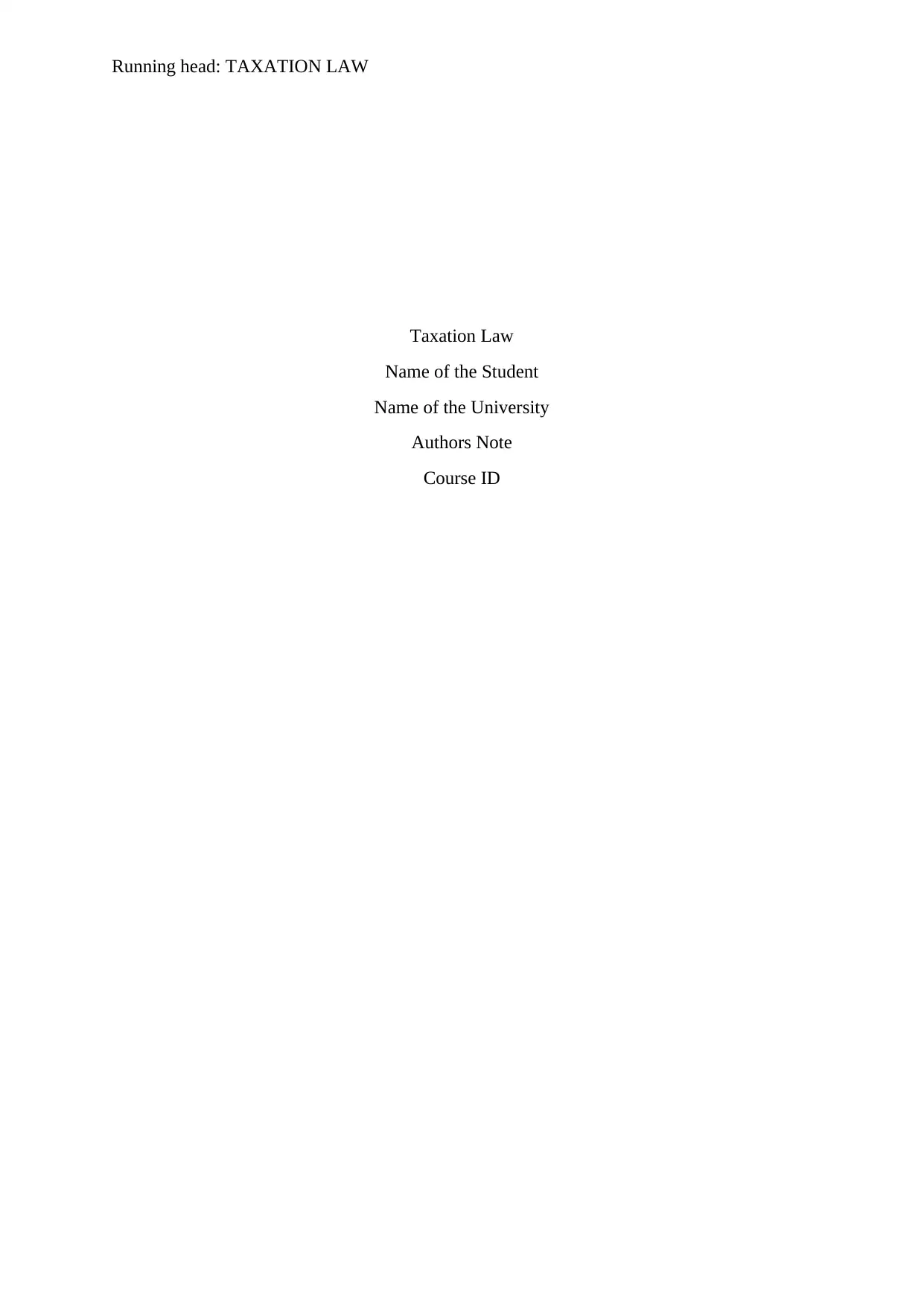
Running head: TAXATION LAW
Taxation Law
Name of the Student
Name of the University
Authors Note
Course ID
Taxation Law
Name of the Student
Name of the University
Authors Note
Course ID
Paraphrase This Document
Need a fresh take? Get an instant paraphrase of this document with our AI Paraphraser
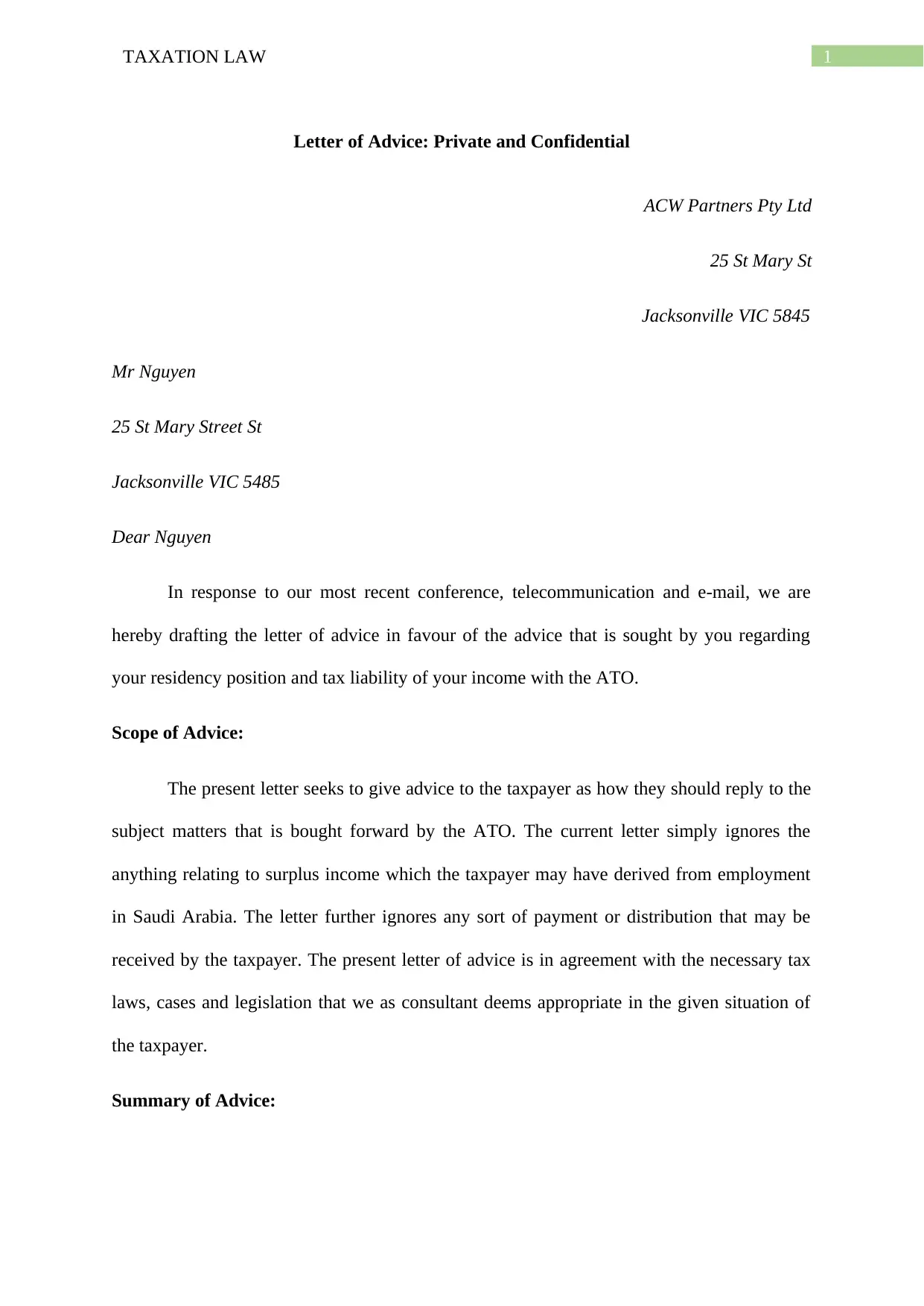
1TAXATION LAW
Letter of Advice: Private and Confidential
ACW Partners Pty Ltd
25 St Mary St
Jacksonville VIC 5845
Mr Nguyen
25 St Mary Street St
Jacksonville VIC 5485
Dear Nguyen
In response to our most recent conference, telecommunication and e-mail, we are
hereby drafting the letter of advice in favour of the advice that is sought by you regarding
your residency position and tax liability of your income with the ATO.
Scope of Advice:
The present letter seeks to give advice to the taxpayer as how they should reply to the
subject matters that is bought forward by the ATO. The current letter simply ignores the
anything relating to surplus income which the taxpayer may have derived from employment
in Saudi Arabia. The letter further ignores any sort of payment or distribution that may be
received by the taxpayer. The present letter of advice is in agreement with the necessary tax
laws, cases and legislation that we as consultant deems appropriate in the given situation of
the taxpayer.
Summary of Advice:
Letter of Advice: Private and Confidential
ACW Partners Pty Ltd
25 St Mary St
Jacksonville VIC 5845
Mr Nguyen
25 St Mary Street St
Jacksonville VIC 5485
Dear Nguyen
In response to our most recent conference, telecommunication and e-mail, we are
hereby drafting the letter of advice in favour of the advice that is sought by you regarding
your residency position and tax liability of your income with the ATO.
Scope of Advice:
The present letter seeks to give advice to the taxpayer as how they should reply to the
subject matters that is bought forward by the ATO. The current letter simply ignores the
anything relating to surplus income which the taxpayer may have derived from employment
in Saudi Arabia. The letter further ignores any sort of payment or distribution that may be
received by the taxpayer. The present letter of advice is in agreement with the necessary tax
laws, cases and legislation that we as consultant deems appropriate in the given situation of
the taxpayer.
Summary of Advice:
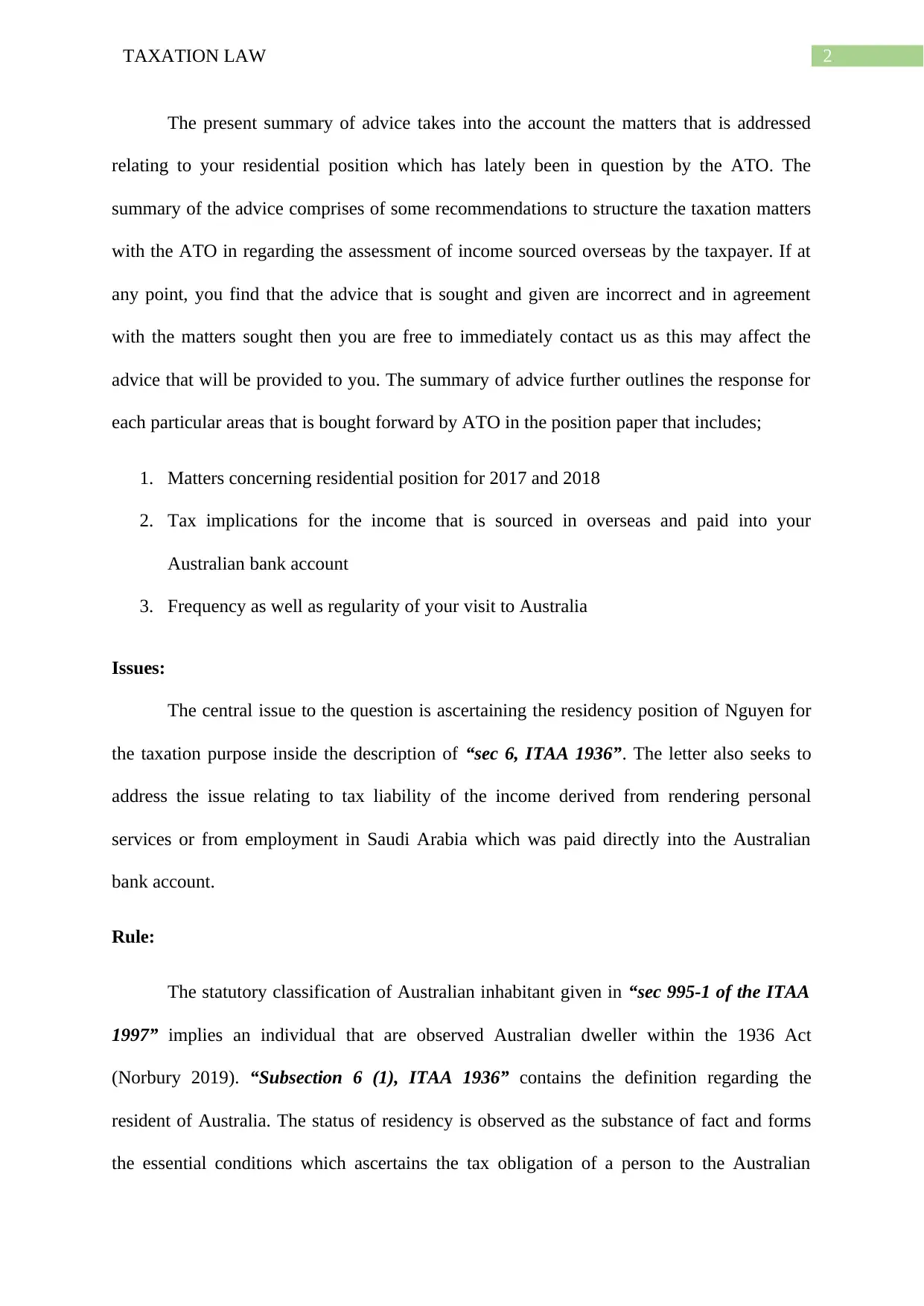
2TAXATION LAW
The present summary of advice takes into the account the matters that is addressed
relating to your residential position which has lately been in question by the ATO. The
summary of the advice comprises of some recommendations to structure the taxation matters
with the ATO in regarding the assessment of income sourced overseas by the taxpayer. If at
any point, you find that the advice that is sought and given are incorrect and in agreement
with the matters sought then you are free to immediately contact us as this may affect the
advice that will be provided to you. The summary of advice further outlines the response for
each particular areas that is bought forward by ATO in the position paper that includes;
1. Matters concerning residential position for 2017 and 2018
2. Tax implications for the income that is sourced in overseas and paid into your
Australian bank account
3. Frequency as well as regularity of your visit to Australia
Issues:
The central issue to the question is ascertaining the residency position of Nguyen for
the taxation purpose inside the description of “sec 6, ITAA 1936”. The letter also seeks to
address the issue relating to tax liability of the income derived from rendering personal
services or from employment in Saudi Arabia which was paid directly into the Australian
bank account.
Rule:
The statutory classification of Australian inhabitant given in “sec 995-1 of the ITAA
1997” implies an individual that are observed Australian dweller within the 1936 Act
(Norbury 2019). “Subsection 6 (1), ITAA 1936” contains the definition regarding the
resident of Australia. The status of residency is observed as the substance of fact and forms
the essential conditions which ascertains the tax obligation of a person to the Australian
The present summary of advice takes into the account the matters that is addressed
relating to your residential position which has lately been in question by the ATO. The
summary of the advice comprises of some recommendations to structure the taxation matters
with the ATO in regarding the assessment of income sourced overseas by the taxpayer. If at
any point, you find that the advice that is sought and given are incorrect and in agreement
with the matters sought then you are free to immediately contact us as this may affect the
advice that will be provided to you. The summary of advice further outlines the response for
each particular areas that is bought forward by ATO in the position paper that includes;
1. Matters concerning residential position for 2017 and 2018
2. Tax implications for the income that is sourced in overseas and paid into your
Australian bank account
3. Frequency as well as regularity of your visit to Australia
Issues:
The central issue to the question is ascertaining the residency position of Nguyen for
the taxation purpose inside the description of “sec 6, ITAA 1936”. The letter also seeks to
address the issue relating to tax liability of the income derived from rendering personal
services or from employment in Saudi Arabia which was paid directly into the Australian
bank account.
Rule:
The statutory classification of Australian inhabitant given in “sec 995-1 of the ITAA
1997” implies an individual that are observed Australian dweller within the 1936 Act
(Norbury 2019). “Subsection 6 (1), ITAA 1936” contains the definition regarding the
resident of Australia. The status of residency is observed as the substance of fact and forms
the essential conditions which ascertains the tax obligation of a person to the Australian
⊘ This is a preview!⊘
Do you want full access?
Subscribe today to unlock all pages.

Trusted by 1+ million students worldwide
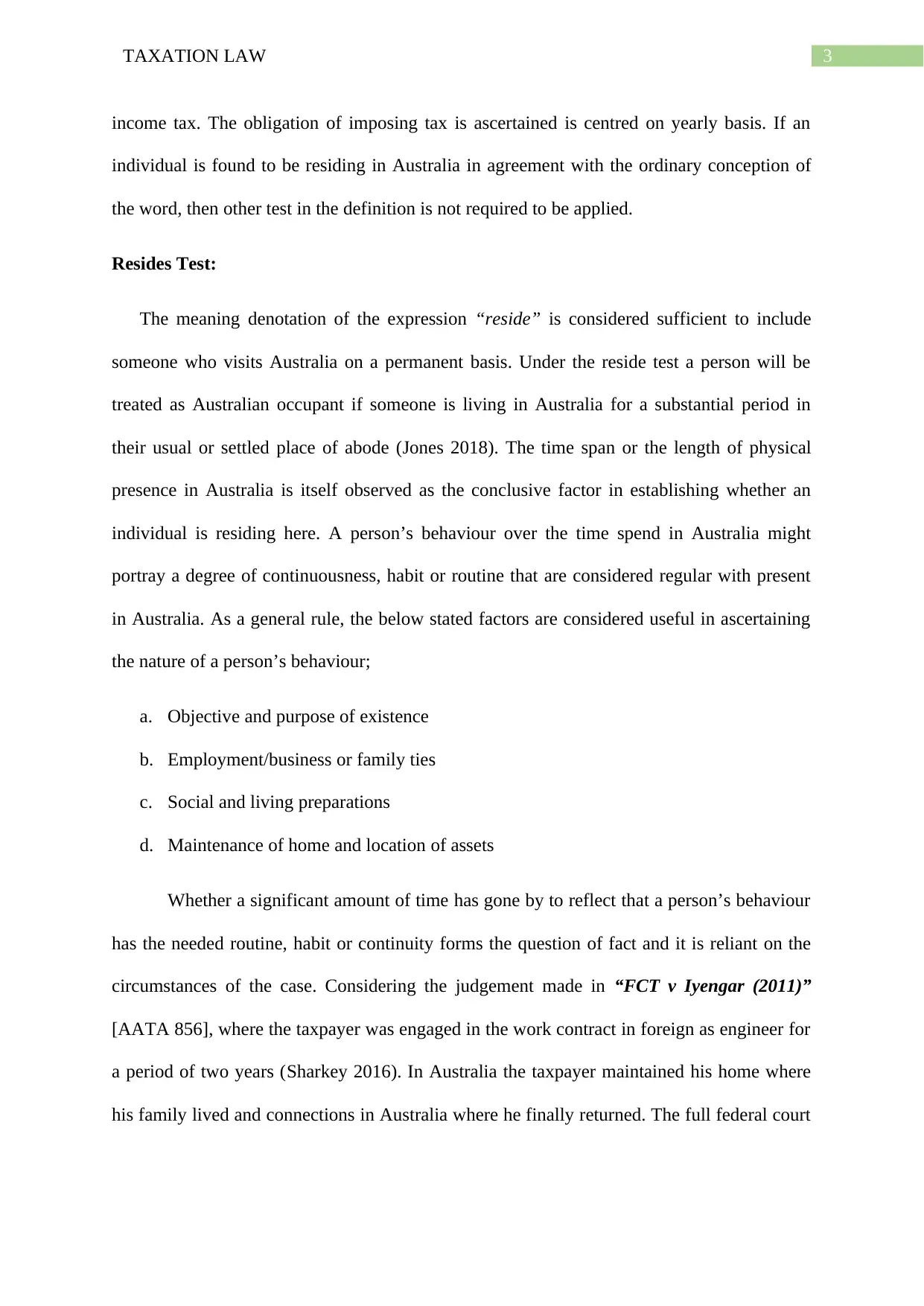
3TAXATION LAW
income tax. The obligation of imposing tax is ascertained is centred on yearly basis. If an
individual is found to be residing in Australia in agreement with the ordinary conception of
the word, then other test in the definition is not required to be applied.
Resides Test:
The meaning denotation of the expression “reside” is considered sufficient to include
someone who visits Australia on a permanent basis. Under the reside test a person will be
treated as Australian occupant if someone is living in Australia for a substantial period in
their usual or settled place of abode (Jones 2018). The time span or the length of physical
presence in Australia is itself observed as the conclusive factor in establishing whether an
individual is residing here. A person’s behaviour over the time spend in Australia might
portray a degree of continuousness, habit or routine that are considered regular with present
in Australia. As a general rule, the below stated factors are considered useful in ascertaining
the nature of a person’s behaviour;
a. Objective and purpose of existence
b. Employment/business or family ties
c. Social and living preparations
d. Maintenance of home and location of assets
Whether a significant amount of time has gone by to reflect that a person’s behaviour
has the needed routine, habit or continuity forms the question of fact and it is reliant on the
circumstances of the case. Considering the judgement made in “FCT v Iyengar (2011)”
[AATA 856], where the taxpayer was engaged in the work contract in foreign as engineer for
a period of two years (Sharkey 2016). In Australia the taxpayer maintained his home where
his family lived and connections in Australia where he finally returned. The full federal court
income tax. The obligation of imposing tax is ascertained is centred on yearly basis. If an
individual is found to be residing in Australia in agreement with the ordinary conception of
the word, then other test in the definition is not required to be applied.
Resides Test:
The meaning denotation of the expression “reside” is considered sufficient to include
someone who visits Australia on a permanent basis. Under the reside test a person will be
treated as Australian occupant if someone is living in Australia for a substantial period in
their usual or settled place of abode (Jones 2018). The time span or the length of physical
presence in Australia is itself observed as the conclusive factor in establishing whether an
individual is residing here. A person’s behaviour over the time spend in Australia might
portray a degree of continuousness, habit or routine that are considered regular with present
in Australia. As a general rule, the below stated factors are considered useful in ascertaining
the nature of a person’s behaviour;
a. Objective and purpose of existence
b. Employment/business or family ties
c. Social and living preparations
d. Maintenance of home and location of assets
Whether a significant amount of time has gone by to reflect that a person’s behaviour
has the needed routine, habit or continuity forms the question of fact and it is reliant on the
circumstances of the case. Considering the judgement made in “FCT v Iyengar (2011)”
[AATA 856], where the taxpayer was engaged in the work contract in foreign as engineer for
a period of two years (Sharkey 2016). In Australia the taxpayer maintained his home where
his family lived and connections in Australia where he finally returned. The full federal court
Paraphrase This Document
Need a fresh take? Get an instant paraphrase of this document with our AI Paraphraser
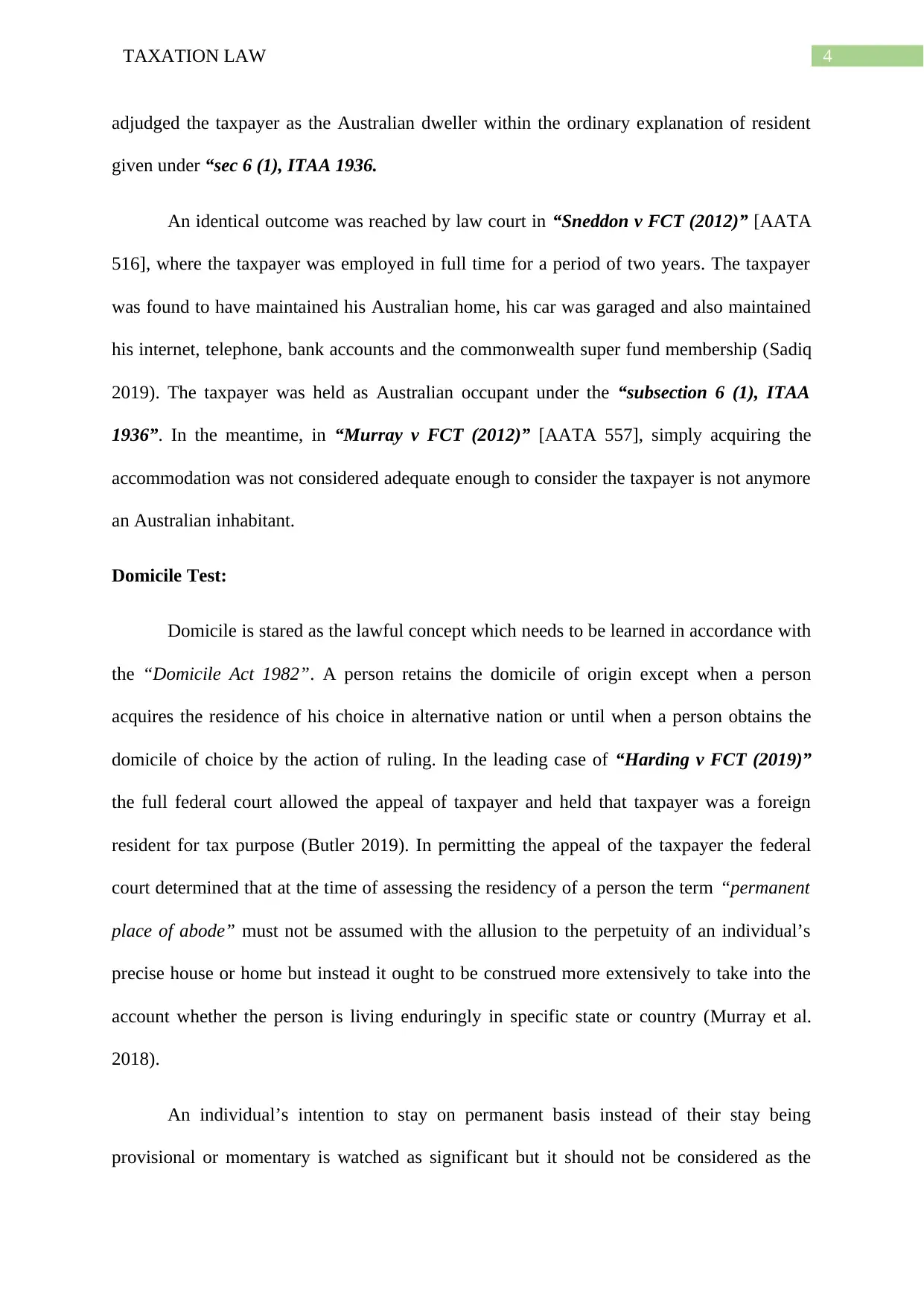
4TAXATION LAW
adjudged the taxpayer as the Australian dweller within the ordinary explanation of resident
given under “sec 6 (1), ITAA 1936.
An identical outcome was reached by law court in “Sneddon v FCT (2012)” [AATA
516], where the taxpayer was employed in full time for a period of two years. The taxpayer
was found to have maintained his Australian home, his car was garaged and also maintained
his internet, telephone, bank accounts and the commonwealth super fund membership (Sadiq
2019). The taxpayer was held as Australian occupant under the “subsection 6 (1), ITAA
1936”. In the meantime, in “Murray v FCT (2012)” [AATA 557], simply acquiring the
accommodation was not considered adequate enough to consider the taxpayer is not anymore
an Australian inhabitant.
Domicile Test:
Domicile is stared as the lawful concept which needs to be learned in accordance with
the “Domicile Act 1982”. A person retains the domicile of origin except when a person
acquires the residence of his choice in alternative nation or until when a person obtains the
domicile of choice by the action of ruling. In the leading case of “Harding v FCT (2019)”
the full federal court allowed the appeal of taxpayer and held that taxpayer was a foreign
resident for tax purpose (Butler 2019). In permitting the appeal of the taxpayer the federal
court determined that at the time of assessing the residency of a person the term “permanent
place of abode” must not be assumed with the allusion to the perpetuity of an individual’s
precise house or home but instead it ought to be construed more extensively to take into the
account whether the person is living enduringly in specific state or country (Murray et al.
2018).
An individual’s intention to stay on permanent basis instead of their stay being
provisional or momentary is watched as significant but it should not be considered as the
adjudged the taxpayer as the Australian dweller within the ordinary explanation of resident
given under “sec 6 (1), ITAA 1936.
An identical outcome was reached by law court in “Sneddon v FCT (2012)” [AATA
516], where the taxpayer was employed in full time for a period of two years. The taxpayer
was found to have maintained his Australian home, his car was garaged and also maintained
his internet, telephone, bank accounts and the commonwealth super fund membership (Sadiq
2019). The taxpayer was held as Australian occupant under the “subsection 6 (1), ITAA
1936”. In the meantime, in “Murray v FCT (2012)” [AATA 557], simply acquiring the
accommodation was not considered adequate enough to consider the taxpayer is not anymore
an Australian inhabitant.
Domicile Test:
Domicile is stared as the lawful concept which needs to be learned in accordance with
the “Domicile Act 1982”. A person retains the domicile of origin except when a person
acquires the residence of his choice in alternative nation or until when a person obtains the
domicile of choice by the action of ruling. In the leading case of “Harding v FCT (2019)”
the full federal court allowed the appeal of taxpayer and held that taxpayer was a foreign
resident for tax purpose (Butler 2019). In permitting the appeal of the taxpayer the federal
court determined that at the time of assessing the residency of a person the term “permanent
place of abode” must not be assumed with the allusion to the perpetuity of an individual’s
precise house or home but instead it ought to be construed more extensively to take into the
account whether the person is living enduringly in specific state or country (Murray et al.
2018).
An individual’s intention to stay on permanent basis instead of their stay being
provisional or momentary is watched as significant but it should not be considered as the
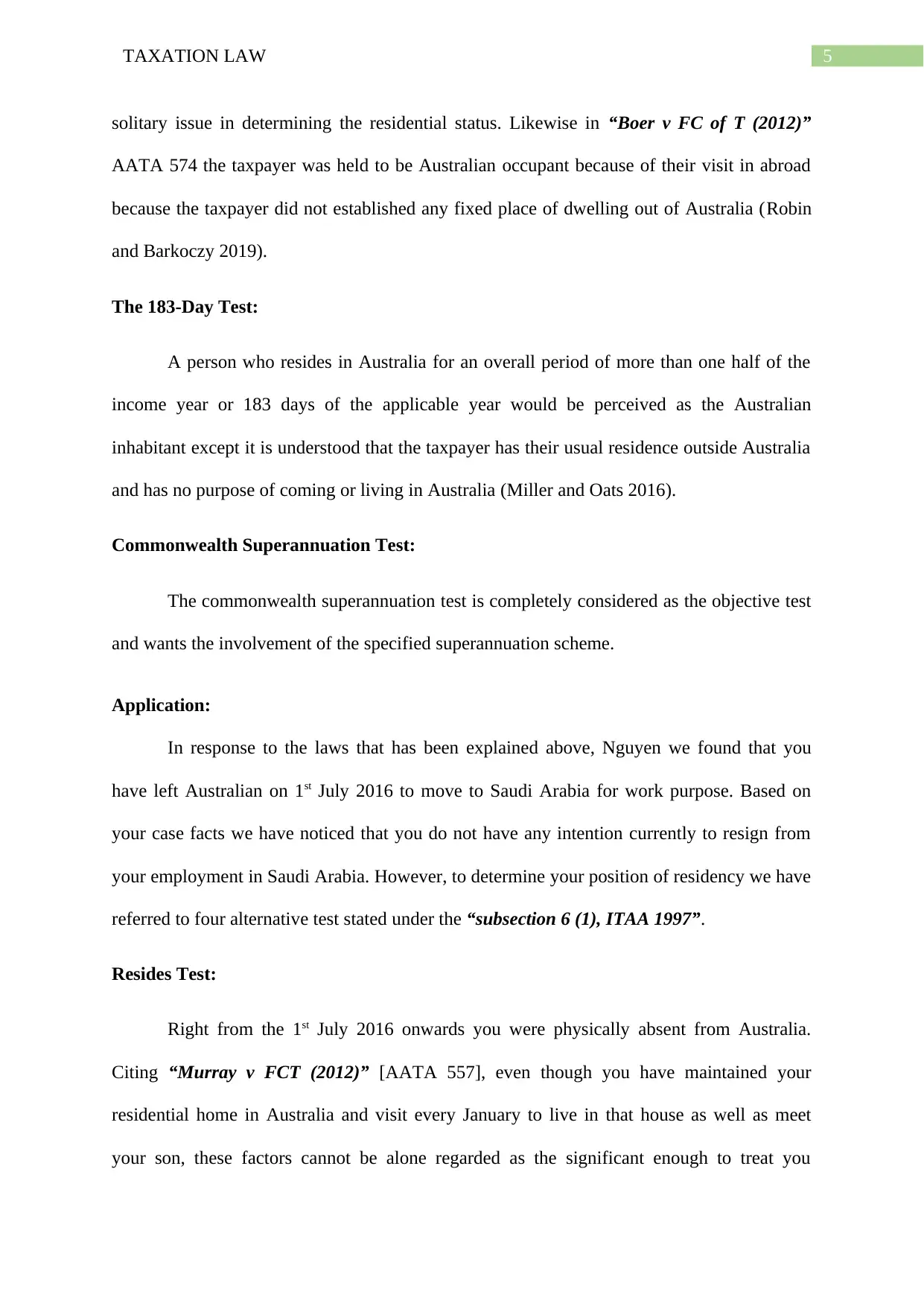
5TAXATION LAW
solitary issue in determining the residential status. Likewise in “Boer v FC of T (2012)”
AATA 574 the taxpayer was held to be Australian occupant because of their visit in abroad
because the taxpayer did not established any fixed place of dwelling out of Australia (Robin
and Barkoczy 2019).
The 183-Day Test:
A person who resides in Australia for an overall period of more than one half of the
income year or 183 days of the applicable year would be perceived as the Australian
inhabitant except it is understood that the taxpayer has their usual residence outside Australia
and has no purpose of coming or living in Australia (Miller and Oats 2016).
Commonwealth Superannuation Test:
The commonwealth superannuation test is completely considered as the objective test
and wants the involvement of the specified superannuation scheme.
Application:
In response to the laws that has been explained above, Nguyen we found that you
have left Australian on 1st July 2016 to move to Saudi Arabia for work purpose. Based on
your case facts we have noticed that you do not have any intention currently to resign from
your employment in Saudi Arabia. However, to determine your position of residency we have
referred to four alternative test stated under the “subsection 6 (1), ITAA 1997”.
Resides Test:
Right from the 1st July 2016 onwards you were physically absent from Australia.
Citing “Murray v FCT (2012)” [AATA 557], even though you have maintained your
residential home in Australia and visit every January to live in that house as well as meet
your son, these factors cannot be alone regarded as the significant enough to treat you
solitary issue in determining the residential status. Likewise in “Boer v FC of T (2012)”
AATA 574 the taxpayer was held to be Australian occupant because of their visit in abroad
because the taxpayer did not established any fixed place of dwelling out of Australia (Robin
and Barkoczy 2019).
The 183-Day Test:
A person who resides in Australia for an overall period of more than one half of the
income year or 183 days of the applicable year would be perceived as the Australian
inhabitant except it is understood that the taxpayer has their usual residence outside Australia
and has no purpose of coming or living in Australia (Miller and Oats 2016).
Commonwealth Superannuation Test:
The commonwealth superannuation test is completely considered as the objective test
and wants the involvement of the specified superannuation scheme.
Application:
In response to the laws that has been explained above, Nguyen we found that you
have left Australian on 1st July 2016 to move to Saudi Arabia for work purpose. Based on
your case facts we have noticed that you do not have any intention currently to resign from
your employment in Saudi Arabia. However, to determine your position of residency we have
referred to four alternative test stated under the “subsection 6 (1), ITAA 1997”.
Resides Test:
Right from the 1st July 2016 onwards you were physically absent from Australia.
Citing “Murray v FCT (2012)” [AATA 557], even though you have maintained your
residential home in Australia and visit every January to live in that house as well as meet
your son, these factors cannot be alone regarded as the significant enough to treat you
⊘ This is a preview!⊘
Do you want full access?
Subscribe today to unlock all pages.

Trusted by 1+ million students worldwide
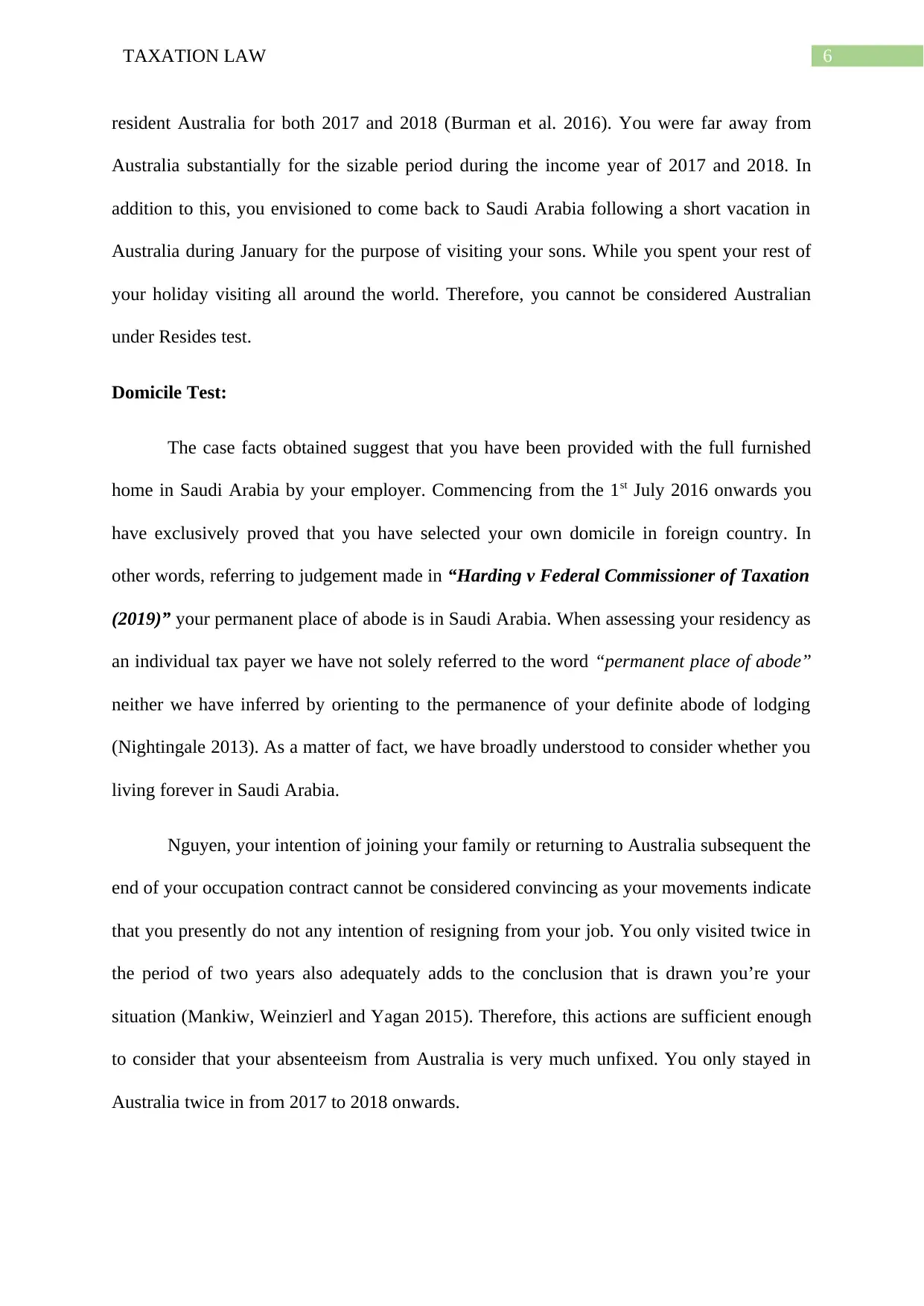
6TAXATION LAW
resident Australia for both 2017 and 2018 (Burman et al. 2016). You were far away from
Australia substantially for the sizable period during the income year of 2017 and 2018. In
addition to this, you envisioned to come back to Saudi Arabia following a short vacation in
Australia during January for the purpose of visiting your sons. While you spent your rest of
your holiday visiting all around the world. Therefore, you cannot be considered Australian
under Resides test.
Domicile Test:
The case facts obtained suggest that you have been provided with the full furnished
home in Saudi Arabia by your employer. Commencing from the 1st July 2016 onwards you
have exclusively proved that you have selected your own domicile in foreign country. In
other words, referring to judgement made in “Harding v Federal Commissioner of Taxation
(2019)” your permanent place of abode is in Saudi Arabia. When assessing your residency as
an individual tax payer we have not solely referred to the word “permanent place of abode”
neither we have inferred by orienting to the permanence of your definite abode of lodging
(Nightingale 2013). As a matter of fact, we have broadly understood to consider whether you
living forever in Saudi Arabia.
Nguyen, your intention of joining your family or returning to Australia subsequent the
end of your occupation contract cannot be considered convincing as your movements indicate
that you presently do not any intention of resigning from your job. You only visited twice in
the period of two years also adequately adds to the conclusion that is drawn you’re your
situation (Mankiw, Weinzierl and Yagan 2015). Therefore, this actions are sufficient enough
to consider that your absenteeism from Australia is very much unfixed. You only stayed in
Australia twice in from 2017 to 2018 onwards.
resident Australia for both 2017 and 2018 (Burman et al. 2016). You were far away from
Australia substantially for the sizable period during the income year of 2017 and 2018. In
addition to this, you envisioned to come back to Saudi Arabia following a short vacation in
Australia during January for the purpose of visiting your sons. While you spent your rest of
your holiday visiting all around the world. Therefore, you cannot be considered Australian
under Resides test.
Domicile Test:
The case facts obtained suggest that you have been provided with the full furnished
home in Saudi Arabia by your employer. Commencing from the 1st July 2016 onwards you
have exclusively proved that you have selected your own domicile in foreign country. In
other words, referring to judgement made in “Harding v Federal Commissioner of Taxation
(2019)” your permanent place of abode is in Saudi Arabia. When assessing your residency as
an individual tax payer we have not solely referred to the word “permanent place of abode”
neither we have inferred by orienting to the permanence of your definite abode of lodging
(Nightingale 2013). As a matter of fact, we have broadly understood to consider whether you
living forever in Saudi Arabia.
Nguyen, your intention of joining your family or returning to Australia subsequent the
end of your occupation contract cannot be considered convincing as your movements indicate
that you presently do not any intention of resigning from your job. You only visited twice in
the period of two years also adequately adds to the conclusion that is drawn you’re your
situation (Mankiw, Weinzierl and Yagan 2015). Therefore, this actions are sufficient enough
to consider that your absenteeism from Australia is very much unfixed. You only stayed in
Australia twice in from 2017 to 2018 onwards.
Paraphrase This Document
Need a fresh take? Get an instant paraphrase of this document with our AI Paraphraser
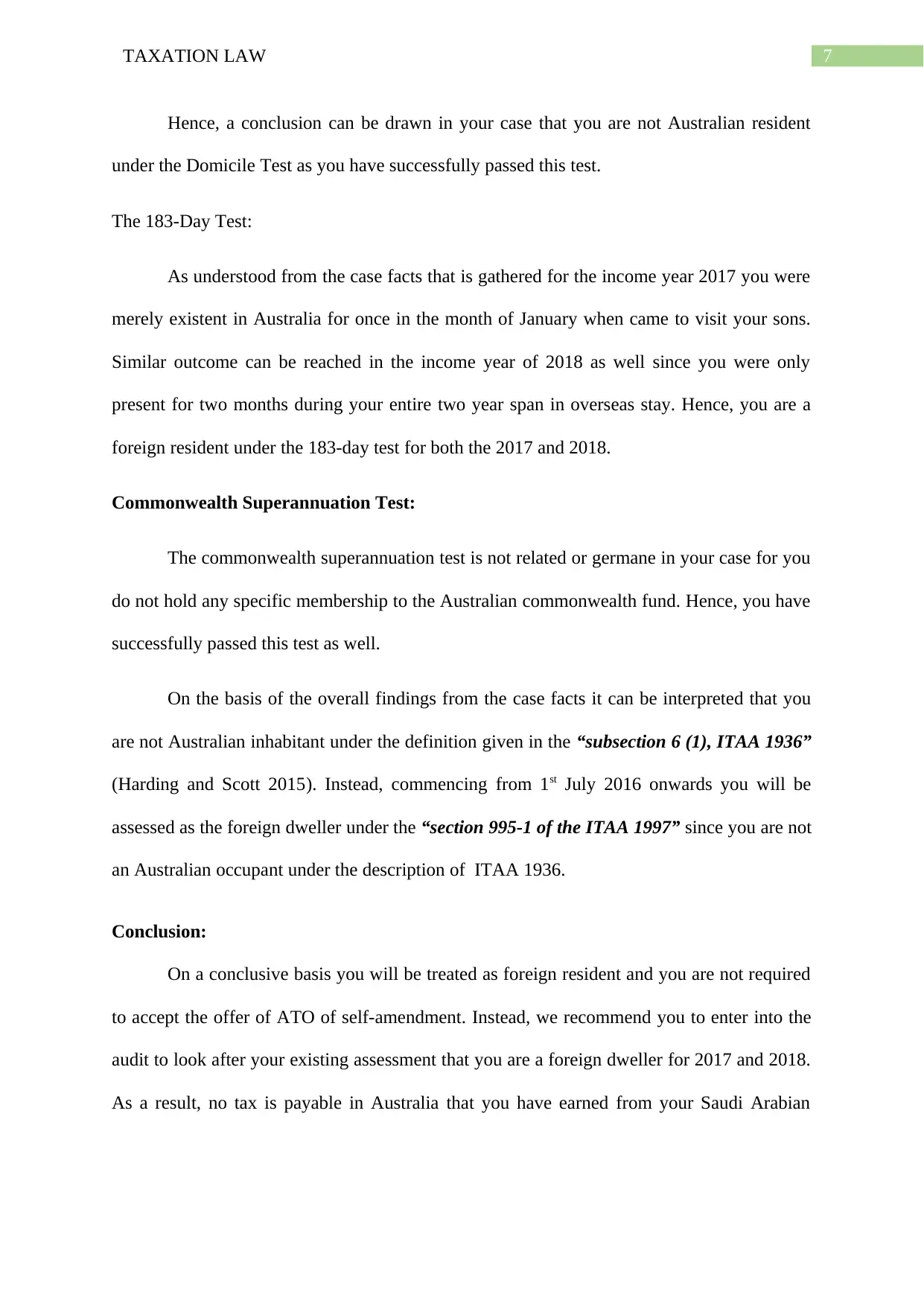
7TAXATION LAW
Hence, a conclusion can be drawn in your case that you are not Australian resident
under the Domicile Test as you have successfully passed this test.
The 183-Day Test:
As understood from the case facts that is gathered for the income year 2017 you were
merely existent in Australia for once in the month of January when came to visit your sons.
Similar outcome can be reached in the income year of 2018 as well since you were only
present for two months during your entire two year span in overseas stay. Hence, you are a
foreign resident under the 183-day test for both the 2017 and 2018.
Commonwealth Superannuation Test:
The commonwealth superannuation test is not related or germane in your case for you
do not hold any specific membership to the Australian commonwealth fund. Hence, you have
successfully passed this test as well.
On the basis of the overall findings from the case facts it can be interpreted that you
are not Australian inhabitant under the definition given in the “subsection 6 (1), ITAA 1936”
(Harding and Scott 2015). Instead, commencing from 1st July 2016 onwards you will be
assessed as the foreign dweller under the “section 995-1 of the ITAA 1997” since you are not
an Australian occupant under the description of ITAA 1936.
Conclusion:
On a conclusive basis you will be treated as foreign resident and you are not required
to accept the offer of ATO of self-amendment. Instead, we recommend you to enter into the
audit to look after your existing assessment that you are a foreign dweller for 2017 and 2018.
As a result, no tax is payable in Australia that you have earned from your Saudi Arabian
Hence, a conclusion can be drawn in your case that you are not Australian resident
under the Domicile Test as you have successfully passed this test.
The 183-Day Test:
As understood from the case facts that is gathered for the income year 2017 you were
merely existent in Australia for once in the month of January when came to visit your sons.
Similar outcome can be reached in the income year of 2018 as well since you were only
present for two months during your entire two year span in overseas stay. Hence, you are a
foreign resident under the 183-day test for both the 2017 and 2018.
Commonwealth Superannuation Test:
The commonwealth superannuation test is not related or germane in your case for you
do not hold any specific membership to the Australian commonwealth fund. Hence, you have
successfully passed this test as well.
On the basis of the overall findings from the case facts it can be interpreted that you
are not Australian inhabitant under the definition given in the “subsection 6 (1), ITAA 1936”
(Harding and Scott 2015). Instead, commencing from 1st July 2016 onwards you will be
assessed as the foreign dweller under the “section 995-1 of the ITAA 1997” since you are not
an Australian occupant under the description of ITAA 1936.
Conclusion:
On a conclusive basis you will be treated as foreign resident and you are not required
to accept the offer of ATO of self-amendment. Instead, we recommend you to enter into the
audit to look after your existing assessment that you are a foreign dweller for 2017 and 2018.
As a result, no tax is payable in Australia that you have earned from your Saudi Arabian
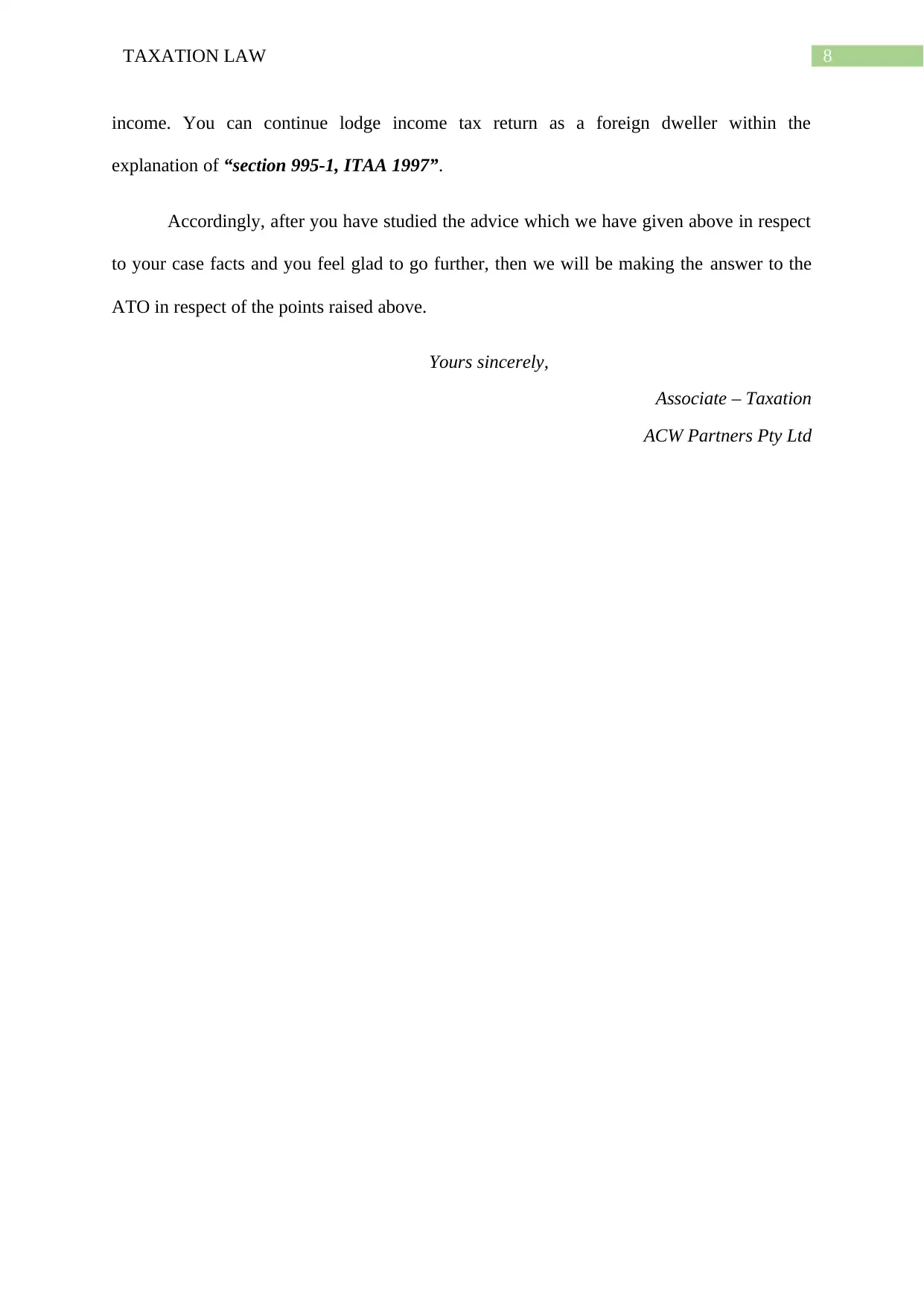
8TAXATION LAW
income. You can continue lodge income tax return as a foreign dweller within the
explanation of “section 995-1, ITAA 1997”.
Accordingly, after you have studied the advice which we have given above in respect
to your case facts and you feel glad to go further, then we will be making the answer to the
ATO in respect of the points raised above.
Yours sincerely,
Associate – Taxation
ACW Partners Pty Ltd
income. You can continue lodge income tax return as a foreign dweller within the
explanation of “section 995-1, ITAA 1997”.
Accordingly, after you have studied the advice which we have given above in respect
to your case facts and you feel glad to go further, then we will be making the answer to the
ATO in respect of the points raised above.
Yours sincerely,
Associate – Taxation
ACW Partners Pty Ltd
⊘ This is a preview!⊘
Do you want full access?
Subscribe today to unlock all pages.

Trusted by 1+ million students worldwide
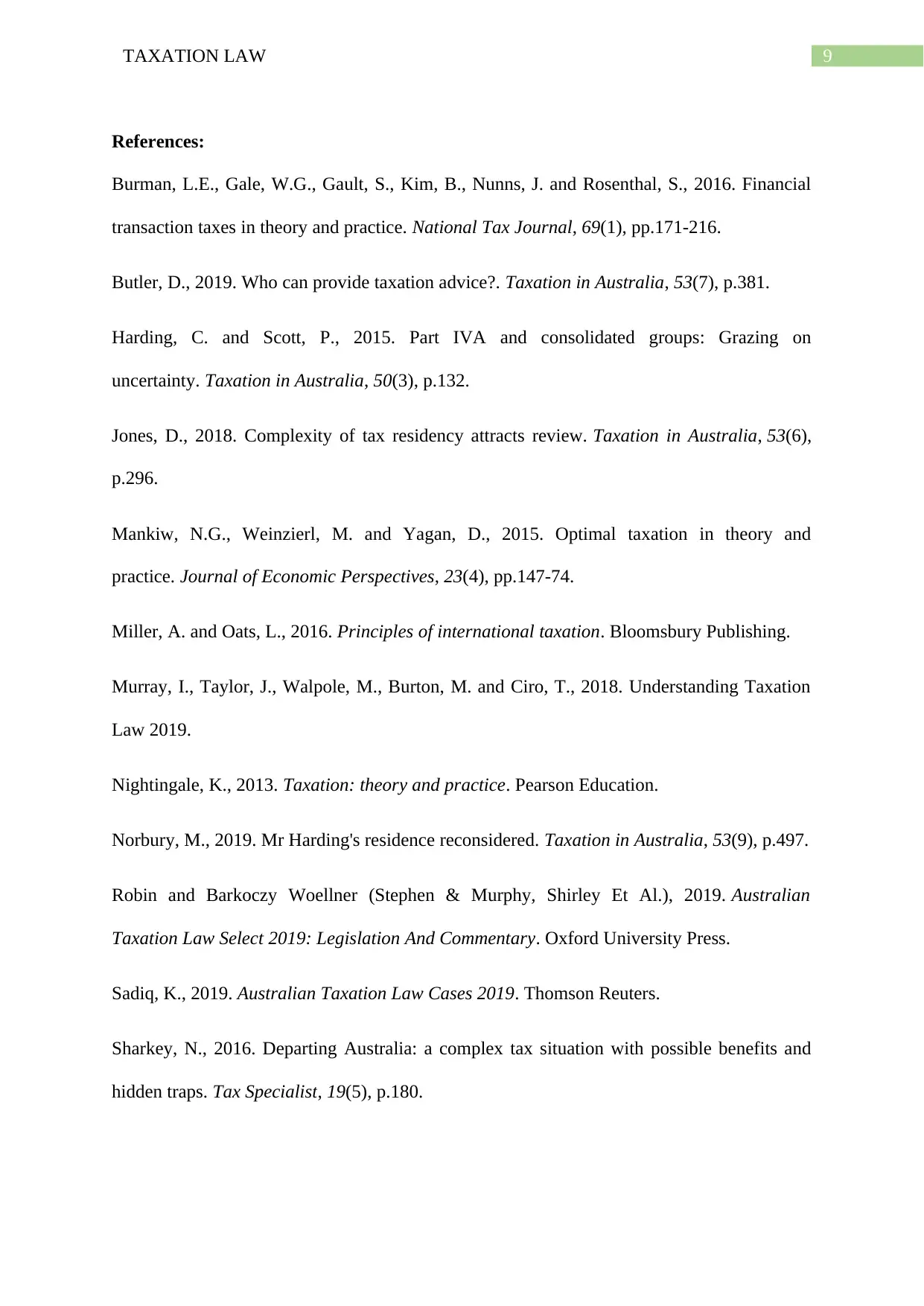
9TAXATION LAW
References:
Burman, L.E., Gale, W.G., Gault, S., Kim, B., Nunns, J. and Rosenthal, S., 2016. Financial
transaction taxes in theory and practice. National Tax Journal, 69(1), pp.171-216.
Butler, D., 2019. Who can provide taxation advice?. Taxation in Australia, 53(7), p.381.
Harding, C. and Scott, P., 2015. Part IVA and consolidated groups: Grazing on
uncertainty. Taxation in Australia, 50(3), p.132.
Jones, D., 2018. Complexity of tax residency attracts review. Taxation in Australia, 53(6),
p.296.
Mankiw, N.G., Weinzierl, M. and Yagan, D., 2015. Optimal taxation in theory and
practice. Journal of Economic Perspectives, 23(4), pp.147-74.
Miller, A. and Oats, L., 2016. Principles of international taxation. Bloomsbury Publishing.
Murray, I., Taylor, J., Walpole, M., Burton, M. and Ciro, T., 2018. Understanding Taxation
Law 2019.
Nightingale, K., 2013. Taxation: theory and practice. Pearson Education.
Norbury, M., 2019. Mr Harding's residence reconsidered. Taxation in Australia, 53(9), p.497.
Robin and Barkoczy Woellner (Stephen & Murphy, Shirley Et Al.), 2019. Australian
Taxation Law Select 2019: Legislation And Commentary. Oxford University Press.
Sadiq, K., 2019. Australian Taxation Law Cases 2019. Thomson Reuters.
Sharkey, N., 2016. Departing Australia: a complex tax situation with possible benefits and
hidden traps. Tax Specialist, 19(5), p.180.
References:
Burman, L.E., Gale, W.G., Gault, S., Kim, B., Nunns, J. and Rosenthal, S., 2016. Financial
transaction taxes in theory and practice. National Tax Journal, 69(1), pp.171-216.
Butler, D., 2019. Who can provide taxation advice?. Taxation in Australia, 53(7), p.381.
Harding, C. and Scott, P., 2015. Part IVA and consolidated groups: Grazing on
uncertainty. Taxation in Australia, 50(3), p.132.
Jones, D., 2018. Complexity of tax residency attracts review. Taxation in Australia, 53(6),
p.296.
Mankiw, N.G., Weinzierl, M. and Yagan, D., 2015. Optimal taxation in theory and
practice. Journal of Economic Perspectives, 23(4), pp.147-74.
Miller, A. and Oats, L., 2016. Principles of international taxation. Bloomsbury Publishing.
Murray, I., Taylor, J., Walpole, M., Burton, M. and Ciro, T., 2018. Understanding Taxation
Law 2019.
Nightingale, K., 2013. Taxation: theory and practice. Pearson Education.
Norbury, M., 2019. Mr Harding's residence reconsidered. Taxation in Australia, 53(9), p.497.
Robin and Barkoczy Woellner (Stephen & Murphy, Shirley Et Al.), 2019. Australian
Taxation Law Select 2019: Legislation And Commentary. Oxford University Press.
Sadiq, K., 2019. Australian Taxation Law Cases 2019. Thomson Reuters.
Sharkey, N., 2016. Departing Australia: a complex tax situation with possible benefits and
hidden traps. Tax Specialist, 19(5), p.180.
Paraphrase This Document
Need a fresh take? Get an instant paraphrase of this document with our AI Paraphraser
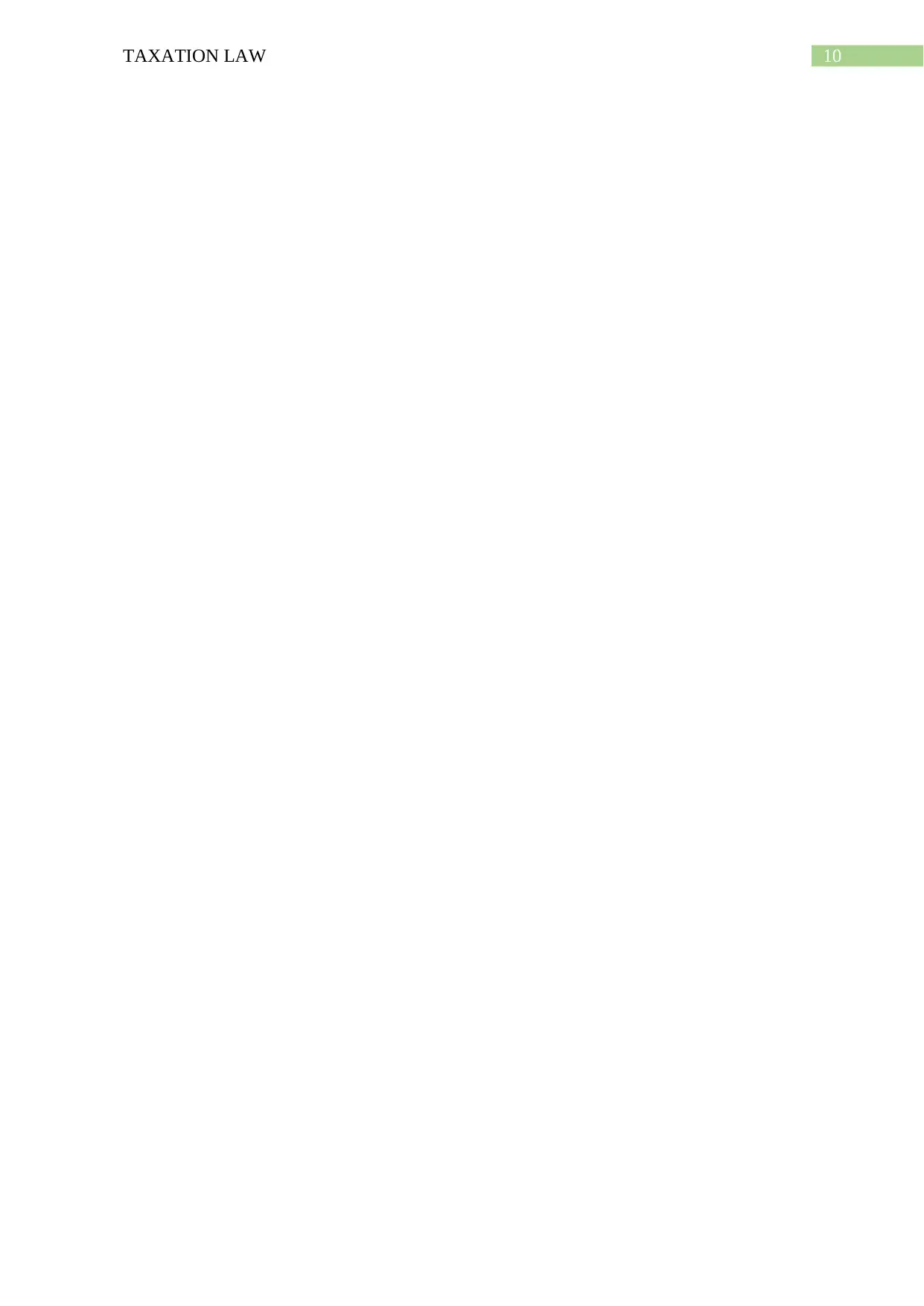
10TAXATION LAW
1 out of 11
Related Documents
Your All-in-One AI-Powered Toolkit for Academic Success.
+13062052269
info@desklib.com
Available 24*7 on WhatsApp / Email
![[object Object]](/_next/static/media/star-bottom.7253800d.svg)
Unlock your academic potential
Copyright © 2020–2026 A2Z Services. All Rights Reserved. Developed and managed by ZUCOL.





